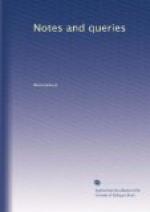These manors, which were inherited from the Herberts by the Somersets, were taken out of the former Marches by the statute 27 Hen. VIII. cap. 26. Sec. 13., and annexed, together with Woolaston, similarly circumstanced, to the country of Gloucester and to the hundred of Westbury; of which hundred, in a legal sense, they still continue a part.
GEO. ORMEROD.
Sedbury Park, Chepstow, April 18. 1850.
J.B.’s Treatise on Nature and Art (No. 25. p. 401.).—The book to which your correspondent “M.” refers, is, I believe, “The Mysteries of Nature and Art, in Foure severall Parts: The First of Water Works,—the Second of Fire Works, &c., &c. By John Bate.”
I have the second edition, 1635; to which is prefixed a rude engraving of the author:—“Vera effigies Johannis Bate, memoria manet, modo permaneant studium et industria.”
HERMES.
“A Frog he would a-wooing go.”—In answer to the inquiry of “B.G.J.” (in No. 25, p. 401.), as to the origin of “‘Heigh ho!’ says Rowley,” I do not think it is older that thirty of thirty-five years, when Liston sang an altered version of the very old song,—
“A frog, he would a-wooing ride,
With sword and buckler by his side,”
and instead of the usual chorus[5], inserted
“Heigho, says Rowley,”
as burthen. Liston’s song was published by Goulding and Co., Soho Square, entitled “The Love-sick Frog,” with an original air by C.E.H., Esq. (qy. Charles Edward Horn?), and an accompaniment by Thomas Cook. The first verse is as follows:—
“A frog he would a-wooing go;
‘Heigh ho!’ says
Rowley;
Whether his mother would let him or no,
With a rowly, powly,
Gammon and spinach,
‘Heigh!’ and Anthony
Rowley,”
R.S.S.
April 23. 1850.
[Footnote 5: In my interleaved copy of Halliwell’s Nursery Rhymes, I have the original song of the “Frog and Mouse” with three different melodies, and nonsense burthens, as sung by my excellent nurse, Betty Richens, whose name I hope to see immortalised in your pages.]
“My Love and I for kisses played, &c.” (No. 19. p. 302.).—The little jeu d’esprit which “Dr. RIMBAULT” {459} has given from Paget’s Common Place Book:—
“My love and I for kisses play’d,”
occurs in the MS. volume from which James Boswell extracted “Shakspeare’s Verses on the King,” but with a much better reading of the last couplet:—
“Nay then, quoth shee, is this your
wrangling vaine?
Give mee my stakes, take your own stakes
againe.”
They are entitled, “Upon a Lover and his Mistris playing for Kisses,” and are there without any name or signature. They remind us of Lilly’s very elegant “Cupid and Campaspe.”
The ballad, or rather ode, as Drayton himself entitles it:—




